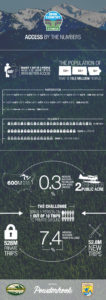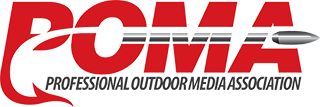
By: Eric Dinger, Co-founder and CEO – Powderhook.com
Spoilage. Remember that word from high school economics class? Spoilage refers to the goods or services we have but couldn’t or didn’t consume before they expired: the airplane that leaves the ground with empty seats or the hotel that lets a night pass with vacant rooms. It’s waste, like brown bananas in the produce aisle.
The access problem in the outdoors is caused by spoilage, not a lack of acres. I propose we call the problem “Latent Access,” and that we get busy fixing it.
“Access to quality hunting and fishing ground is the most significant challenge facing the future of hunting,” says Doug Saunders of the National Wild Turkey Federation. “Organizations like ours and government organizations can only do so much. The largest impact needs to come from private individuals sharing their access.”
THE MATH IS CLEAR
According to the National Shooting Sports Foundation, 45 percent of sportsmen say they would take more trips if access challenges weren’t standing in the way. The outdoor industry is chock full of people, companies, and organizations that know access is a problem and want to do something about it.
U.S. Fish and Wildlife data tells us there are 33 million anglers and 13 million hunters in the United States. Seventy percent of hunters also fished, making for 37 million total sportsmen. These folks got out 711 million days in 2011, of which the NSSF estimates roughly 60 percent were on exclusively private ground. (2 people on a 2 day fishing trip is 4 “days”) That adds up to 283 million public or “some public” days and 528 million exclusively private days.
Powderhook.com, has maps for almost 560 million acres of public ground. Thus, let’s estimate there are, very roughly, 600 million public land acres available to hunters and anglers in the US today. For simplicity, let’s say we get around 2 trips per public acre. (Roughly 600 million acres/roughly 300 million days)
If the average holds true, for every 1 million public acres gained, we add about 2 million trips, or an increase of less than 3 tenths of a percent in total trips.
Americans hunted and fished 528 million days on exclusively private ground in 2011. If each person took along a new person, filled additional seat in their blind or took just one person to their turkey spot every tenth time they went, that would increase days afield by 52.8 million. That’s an increase of 7.4% in one year.
Our industry leaders need to continue to fight for acres. We cannot ease up on the political and social movement around public access for which our NGO’s, federal and state organizations, and many of you have fought so hard. However, the math is clear; the fight for access must center on private ground.
YOUR ROLE IN THE PROBLEM
With so much of the attention on acres, we aren’t giving proper credit to one of the biggest problems: you and me. The math is clear; we can only solve the access problem by decreasing the Latent Access in our own lives.
Some of the most desirable places to hunt and fish are often the most private. That’s part of the appeal, right? Having a place to call your own—to manage the way you choose, to hunt when you want. To invest in and care for productive land remains one of the great goals of a modern sportsman.
The following scenarios have become commonplace:
EXHIBIT A: THE DEER LOCK-OUT
Group A has a deer-hunting lease on 160 acres in Kansas for which they pay a hefty fee in return for an expectation that the landowner will help protect their interest by letting no one else hunt. At the end of the day, it’s only a deer lease. No one hunts light geese in March, or the toms that strut their way through the April morning. No doves are taken the 1st of September, no does are culled, no predators hunted. In effect, 160 acres have been “taken away” from the broader body of sportsmen so that a couple of people can hunt for a couple of days.
EXHIBIT B: THE DUCK CLUBBERS
Group B has a duck club. They’re duck-loving diehards. They love breakfast and stories in the blind just like anyone else. They do it right – get in early, stay all day, shoot no more than their limit and take joy in preparing the meat for their families. They’re sportsmen. It also happens the jobs that afford them the luxury of a good duck lease prevent them from using it all but a couple of days of the year. Most days, including many of the best days, the blind sits empty.
This is Latent Access in action, and it is hurting hunting and fishing numbers in ways public land managers, government organizations, and non-profits cannot repair. It’s a complex problem: It’s hard for people to find a place to hunt or fish, and it’s difficult and perhaps counterproductive for those who have a spot to share it.
SELLING, DONATING AND TRADING ACCESS
If you’re still reading this, you are probably fairly frustrated by now. That’s your deer lease, right? Who am I to argue otherwise? You did the work. You paid your dues at work so you could afford to pay your way and now some guy is telling you that you’re part of the problem? I share your sentiment because I’m part of the problem, too. So is everyone who has worked hard to earn an exclusive hunting or fishing spot.
If you consider the bigger picture, there are solutions that respect your effort and property rights, and solve the problem of access that threatens to atrophy our rich outdoors traditions.
Here’s what I propose you can do, personally, to engage in the fight: First, decide if you’re going to perpetuate a hunting or fishing legacy. Do you believe hunting and fishing are important enough to preserve? It’s a personal decision that requires individual action and responsibility.
If your answer is yes, you need to do a couple things:
1. Assess your inventory. What access do you have that you do and do not use? Are there empty seats in your duck blind on the days you don’t go? How about on the days that you do go? Could you bring an additional person to hunt with you? If you love to fish and own some ground because it has a pond on it, could you donate a dove hunt to a youth organization?
2. Have you—personally—introduced your passion to a new person this year? Could you? Could you leverage the access you’ve secured to give a new person, young or old, a taste of what it feels like to get out? Americans spent 711 million days afield in 2011? If you’re near the average you probably made it out about 20 days last year. What if every tenth time you went out on private ground you brought someone new with you? Remember, just 1 out of 10 days on private land would add more than 53 million days in the field to the total, raising private land participation, and thus total access, by more than 7 percent.
Let’s be clear; things are going to go wrong. A young fisherman will leave his or her trash. Someone is going to run into your electric fence. It’s going to happen, so let’s face it together, right now. Legacy building is never simple. The National Wild Turkey Federation proclaims, “Save the Habitat. Save the Hunt.” Other organizations like Rocky Mountain Elk Foundation say, “Hunting is Conservation.” But no government, no state organization and no non-profit can do what you can do with just 1 out of every 10 trips you take.
Remember, these recruitment, retention and reactivation intitiatives aren’t talking about you going hunting or fishing. You already go. Four and half out of every ten people who hunt or fish would go more often if they had better access. That means you know lots of them. NWTF, RMEF and countless other organizations are talking about you doing the very personal work of saving hunting and fishing, not just going hunting or fishing yourself.
To do that you must share your passion and your access.
One extra person every tenth time you go.
With that in mind, here are a few ideas to get you started:
· Donate a weekend in your turkey spot to the local NWTF Jakes or Ducks Unlimited Green Wings, programs designed to give kids access to hunting and the shooting sports.
· Not going to fish your pond this weekend? Sell or give a catch and release-only trip to some local college students.
· Trade your duck spot in Arkansas with a group who has pheasant ground in South Dakota.
· If your agreement permits it, sell a predator hunt on the ground you lease for deer hunting.
· Invite the neighbor kid the next time you’re planning to head up and dip a fly. Encourage him to bring a friend along, too.
· Sell trapping rights on your property during the months you don’t hunt it.
· Emptying the flight pens at your controlled shooting area? Make it a newcomer’s hunt in which your members have to bring a guest in order to participate.
If you hit a snag, get in touch with the folks here at Powderhook and we can help you make it happen.
Eric Dinger is the CEO of Powderhook, an online marketplace for finding, selling, trading or donating hunting and fishing spots.
Contact: Eric Dinger
Note: Please include a link to the Open Country Blog on OutdoorLife.com – http://www.outdoorlife.com/blogs/open-country
Info-graphic attached.
Links:
NWTF: http://www.nwtf.org/Save-the-Habitat-Save-the-Hunt/
RMEF: http://www.rmef.org/Conservation/HuntingIsConservation.aspx
Powderhook: www.powderhook.com
Originally Posted: http://www.outdoorlife.com/blogs/open-country/2014/03/access-manifesto-trading-places-you-have-opportunity-you-lack
###


